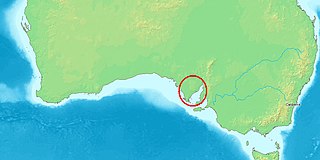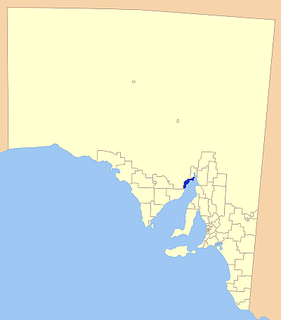
Whyalla was founded as "Hummocks Hill", and was known by that name until 1916. It is the fourth most populous city in the Australian state of South Australia after Adelaide, Mount Gambier and Gawler and along with Port Pirie and Port Augusta is one of the three towns to make up the Iron Triangle. As at June 2018, Whyalla had an urban population of 21,742, having declined at an average annual rate of -0.75% year-on-year over the preceding five years. It is a seaport located on the east coast of the Eyre Peninsula and is known as the "Steel City" due to its integrated steelworks and shipbuilding heritage. The port of Whyalla has been exporting iron ore since 1903.

The Spencer Gulf is the westernmost and larger of two large inlets on the southern coast of Australia, in the state of South Australia, facing the Great Australian Bight. It spans from the Cape Catastrophe and Eyre Peninsula in the west to Cape Spencer and Yorke Peninsula in the east.

Port Augusta is a small city in South Australia. Formerly a seaport, it is now a road traffic and railway junction city mainly located on the east coast of the Spencer Gulf immediately south of the gulf's head and about 322 kilometres (200 mi) north of the state capital, Adelaide. The suburb of Port Augusta West is located on the west side of the gulf on the Eyre Peninsula. Other major industries included, up until the mid-2010s, electricity generation. At June 2018, the estimated urban population was 13,799, having declined at an average annual rate of -0.53% over the preceding five years.
The Eyre Peninsula is a triangular peninsula in South Australia. It is bounded on the east by Spencer Gulf, the west by the Great Australian Bight, and the north by the Gawler Ranges.
Arno Bay is a small fishing and tourist town on the east coast of Eyre Peninsula in South Australia, located on the Lincoln Highway about halfway between Whyalla and Port Lincoln. First proclaimed under the name Bligh in 1883, the current name dates back to 1940. It is a recreational town with a number of marine and nature based attractions, including fishing, surfing and swimming.

Kimba is a rural service town on the Eyre Highway at the top of Eyre Peninsula in the Australian state of South Australia. At the 2016 census, Kimba had a population of 629 and it has an annual rainfall of 348 millimetres (13.7 in). There is an 8-metre (26 ft) tall statue of a galah beside the highway, marking halfway between the east and west coasts of Australia. The Gawler Ranges are north of the highway near the town.

The City of Whyalla is a local government area in South Australia, located at the north-east corner of the Eyre Peninsula. It was established in 1970, replacing the town commission, which had been running the town previously. The district is mostly industrial, with many large companies having factories in the city.

Whyalla High School is a high school located in the city of Whyalla in the Australian state of South Australia catering for school years 8–10.

Port Bonython is the location of a deepwater port, gas fractionation plant and diesel storage facility west of Point Lowly in the Upper Spencer Gulf region of South Australia. It lies 16 km east-northeast of Whyalla, South Australia and approximately 370 km north-west of the State's capital city, Adelaide. The existing wharf is 2.4 kilometres long and is capable of berthing small Capesize ships with a maximum capacity of 110,000 tonnes. The wharf was established in 1982 and named after John Bonython, the founding chairman of Santos. The structure is leased to Santos by the Government of South Australia and is used for the export of hydrocarbon products. An oil spill at Port Bonython in 1992 resulted in loss of bird life and damage to mangrove habitats to the west and southwest of Port Pirie.

Edward John Eyre High School is located in Whyalla Norrie, South Australia. It opened in 1968 as Eyre Technical High School.

Port Augusta West is a suburb of Port Augusta, South Australia.

Lucky Bay is a locality in the District Council of Franklin Harbour, on the Spencer Gulf coast of Eyre Peninsula in South Australia. It is a terminus for SeaSA's Spencer Gulf passenger ferry and a transshipping port for grain export operated by T-Ports. Lucky Bay is located immediately north-east of the Franklin Harbour wetlands. Its adjacent waters lie within the outer boundary of the Franklin Harbor Marine Park. A ferry service crossing Spencer Gulf from Lucky Bay to Wallaroo commenced in 2006, and the dirt road connecting Lucky Bay with the Lincoln Highway was sealed in 2008.

Point Lowly is the tip of a small peninsula north north-east of Whyalla in the Upper Spencer Gulf region of South Australia. The wider peninsula is shared by a combination of defence, industrial, residential, recreational and tourism interests. Port Bonython lies immediately to the north-west and is marked for future industrial expansion, driven by anticipated growth in the State's mining industry. The icons of the peninsula are the historic Point Lowly Lighthouse and the mass breeding aggregation of giant Australian cuttlefish which occurs inshore each winter.
The Whyalla News is a newspaper serving the town of Whyalla on Eyre Peninsula, South Australia since 1940. It was later sold to Rural Press, previously owned by Fairfax Media, but now an Australian media company trading as Australian Community Media.
Port Bonython Fuels is a fuel importation and diesel distribution hub at Port Bonython on the Point Lowly peninsula in South Australia's upper Spencer Gulf region. The development was designed to supply the State's expanding oil, gas and mineral resources sectors' operations in the north and west of the state. It allows South Australia to import fuel from ships carrying cargoes in excess of 100,000 tonnes- approximately four times the size of vessels currently importing diesel via Port Adelaide. The project is owned by Petro Diamond Australia, a wholly owned subsidiary of Mitsubishi Corporation. The first stage of the project was officially opened in May 2016.
Whyalla Norrie is a suburb of Whyalla on the Eyre Peninsula of South Australia. It was gazetted as a distinct suburb in 1967, and had its boundaries altered in 1975 and 2000. It is bounded by Iron Knob Road, Norrie Avenue, Broadbent Terrace and MacDouall Stuart Avenue. It is part of the City of Whyalla.
County of Manchester is a cadastral unit located in the Australian state of South Australia that covers land both located in the north-east of Eyre Peninsula and to the peninsula's north. It was proclaimed in 1891 and named after George Montagu, 6th Duke of Manchester who was the father-in-law of the Rt Hon. Earl of Kintore GCMG, the Governor of South Australia at the time.
Clean Seas Seafood Ltd is an Australian seafood production company specialising in the sea-cage aquaculture of Yellowtail kingfish. It was established by The Stehr Group in 2000, and became the first Australian company fish farming in South Australia to be listed on the ASX in 2005. The company was established by "tuna baron" Hagen Stehr, whose son Marcus remains one of the company's directors. Clean Seas has shore and sea-based fish farming facilities at Arno Bay, aquaculture leases in Fitzgerald Bay and near Port Lincoln and a processing facility at Royal Park in Adelaide. Its tuna interests were originally held by the private company Australian Tuna Fisheries Pty Ltd. Clean Seas' ambition to control and commercialise the lifecycle of the Southern bluefin tuna has not been realised.
Fitzgerald Bay is a large bay located between Point Lowly and Backy Point in South Australia's upper Spencer Gulf. The bay's shoreline consists mostly of pebble beaches and sparse grey mangroves. In the 2000s the bay was used for the farming of yellowtail kingfish until their closure circa 2011 in response to high levels of fish mortality. Understanding of the environmental impacts of yellowtail kingfish farming is limited. As of 2021, fish farming has not returned to Fitzgerald Bay, but aquaculture zones remain in place, and Clean Seas is authorised to restock fish farms there. There are approximately forty shacks and coastal homes sparsely distributed along the fringe of Fitzgerald Bay whose interests are represented by the Cultana Jenkins Shackowners' Association.
Fish farming in South Australia is a major economic contributor to the state's seafood sector. The most valuable species is the Southern bluefin tuna, which is caught in the wild then transferred into sea cages in southern Spencer Gulf where they are fed locally caught sardines. The second most valuable species is the Yellowtail kingfish, which is farmed near Port Lincoln and Arno Bay. A tourist venture called Oceanic Victor located in Encounter Bay allows paying customers the opportunity to swim in a sea cage with the Southern bluefin tuna and handfeed the fish. Prominent companies in the fish farming sector in South Australia include Clean Seas and Tony's Tuna International.












